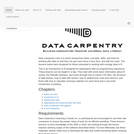
Data Carpentry lesson from Ecology curriculum to learn how to analyse and visualise ecological data in R. Data Carpentry’s aim is to teach researchers basic concepts, skills, and tools for working with data so that they can get more done in less time, and with less pain. The lessons below were designed for those interested in working with ecology data in R. This is an introduction to R designed for participants with no programming experience. These lessons can be taught in a day (~ 6 hours). They start with some basic information about R syntax, the RStudio interface, and move through how to import CSV files, the structure of data frames, how to deal with factors, how to add/remove rows and columns, how to calculate summary statistics from a data frame, and a brief introduction to plotting. The last lesson demonstrates how to work with databases directly from R.
- Subject:
- Applied Science
- Computer Science
- Ecology
- Information Science
- Life Science
- Mathematics
- Measurement and Data
- Material Type:
- Module
- Provider:
- The Carpentries
- Author:
- Ankenbrand, Markus
- Arindam Basu
- Ashander, Jaime
- Bahlai, Christie
- Bailey, Alistair
- Becker, Erin Alison
- Bledsoe, Ellen
- Boehm, Fred
- Bolker, Ben
- Bouquin, Daina
- Burge, Olivia Rata
- Burle, Marie-Helene
- Carchedi, Nick
- Chatzidimitriou, Kyriakos
- Chiapello, Marco
- Conrado, Ana Costa
- Cortijo, Sandra
- Cranston, Karen
- Cuesta, Sergio Martínez
- Culshaw-Maurer, Michael
- Czapanskiy, Max
- Daijiang Li
- Dashnow, Harriet
- Daskalova, Gergana
- Deer, Lachlan
- Direk, Kenan
- Dunic, Jillian
- Elahi, Robin
- Fishman, Dmytro
- Fouilloux, Anne
- Fournier, Auriel
- Gan, Emilia
- Goswami, Shubhang
- Guillou, Stéphane
- Hancock, Stacey
- Hardenberg, Achaz Von
- Harrison, Paul
- Hart, Ted
- Herr, Joshua R.
- Hertweck, Kate
- Hodges, Toby
- Hulshof, Catherine
- Humburg, Peter
- Jean, Martin
- Johnson, Carolina
- Johnson, Kayla
- Johnston, Myfanwy
- Jordan, Kari L
- K. A. S. Mislan
- Kaupp, Jake
- Keane, Jonathan
- Kerchner, Dan
- Klinges, David
- Koontz, Michael
- Leinweber, Katrin
- Lepore, Mauro Luciano
- Li, Ye
- Lijnzaad, Philip
- Lotterhos, Katie
- Mannheimer, Sara
- Marwick, Ben
- Michonneau, François
- Millar, Justin
- Moreno, Melissa
- Najko Jahn
- Obeng, Adam
- Odom, Gabriel J.
- Pauloo, Richard
- Pawlik, Aleksandra Natalia
- Pearse, Will
- Peck, Kayla
- Pederson, Steve
- Peek, Ryan
- Pletzer, Alex
- Quinn, Danielle
- Rajeg, Gede Primahadi Wijaya
- Reiter, Taylor
- Rodriguez-Sanchez, Francisco
- Sandmann, Thomas
- Seok, Brian
- Sfn_brt
- Shiklomanov, Alexey
- Shivshankar Umashankar
- Stachelek, Joseph
- Strauss, Eli
- Sumedh
- Switzer, Callin
- Tarkowski, Leszek
- Tavares, Hugo
- Teal, Tracy
- Theobold, Allison
- Tirok, Katrin
- Tylén, Kristian
- Vanichkina, Darya
- Voter, Carolyn
- Webster, Tara
- Weisner, Michael
- White, Ethan P
- Wilson, Earle
- Woo, Kara
- Wright, April
- Yanco, Scott
- Ye, Hao
- Date Added:
- 03/20/2017
